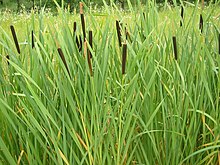Typha
| Typha | |
|---|---|

| |
| Typha latifolia | |
| Scientific classification | |
| Kinrick: | Plantae |
| (unranked): | Angiosperms |
| (unranked): | Monocots |
| (unranked): | Commelinids |
| Order: | Poales |
| Faimily: | Typhaceae |
| Genus: | Typha L. |
| Species | |
|
See text | |
| Nutreetional value per 100 g (3.5 oz) | |
|---|---|
| Energy | 106 kJ (25 kcal) |
5.14 g | |
| Succars | 0.22 g |
| Dietary fibre | 4.5 g |
0.00 g | |
1.18 g | |
| Vitamins | |
| Vitamin A equiv. | (0%) 1 μg(0%) 6 μg |
| Thiamine (B1) | (2%) 0.023 mg |
| Riboflavin (B2) | (2%) 0.025 mg |
| Niacin (B3) | (3%) 0.440 mg |
| Pantothenic acid (B5) | (5%) 0.234 mg |
| Vitamin B6 | (9%) 0.123 mg |
| Folate (B9) | (1%) 3 μg |
| Choline | (5%) 23.7 mg |
| Vitamin C | (1%) 0.7 mg |
| Vitamin K | (22%) 22.8 μg |
| Meenerals | |
| Calcium | (5%) 54 mg |
| Airn | (7%) 0.91 mg |
| Magnesium | (18%) 63 mg |
| Manganese | (36%) 0.760 mg |
| Phosphorus | (6%) 45 mg |
| Potassium | (7%) 309 mg |
| Sodium | (7%) 109 mg |
| Zinc | (3%) 0.24 mg |
| Ither constituents | |
| Watter | 92.65 g |
| |
| Percentages are approximated uisin US recommendations for adults. Source: USDA Nutrient Database | |
Typha /ˈtaɪfə/ is a genus o aboot eleven species o monocotyledonous flouerin plants in the faimily Typhaceae. The genus haes a lairgely Northren Hemisphere distribution, but is essentially cosmopolitan, bein foond in a variety o wetland habitats.
The rhizomes are edible. Evidence o preserved starch grains on grindin stanes suggests thay wur eaten in Europe 30,000 years ago.[1]
Species
eedit- Typha angustifolia – lesser bulrush, nairae leaf cattail (Americae), or jambu (Indie)
- Typha domingensis – bulrush, soothern cattail (Americae), nairae-leaved cumbungi (Australie)
- Typha × glauca (T. angustifolia × T. latifolia) – hybrid cattail, white cattail (a sterile hybrid[2])
- Typha latifolia – common cattail
- Typha laxmannii – Laxman's bulrush
- Typha minima – dwarf bulrush
- Typha orientalis – broadleaf cumbungi (Australie), raupo (New Zealand)
- Typha capensis – Cape bulrush
- Typha shuttleworthii – Shuttleworth's bulrush
References
eedit- ↑ Revedin, A.; et al. (2010). "Thirty thousand-year-old evidence of plant food processing". Proc Natl Acad Sci U S A. 107 (44): 18815–18819. Bibcode:2010PNAS..10718815R. doi:10.1073/pnas.1006993107. PMC 2973873. PMID 20956317. Explicit use of et al. in:
|first1=(help); Invalid|display-authors=9(help) - ↑ Selbo, S. M.; Snow, A. A. (2004). "The potential for hybridization between Typha angustifolia and Typha latifolia in a constructed wetland" (PDF). Aquatic Botany. 78 (4): 361–369. doi:10.1016/j.aquabot.2004.01.003. Archived frae the original (PDF) on 8 August 2017. Retrieved 28 December 2013.